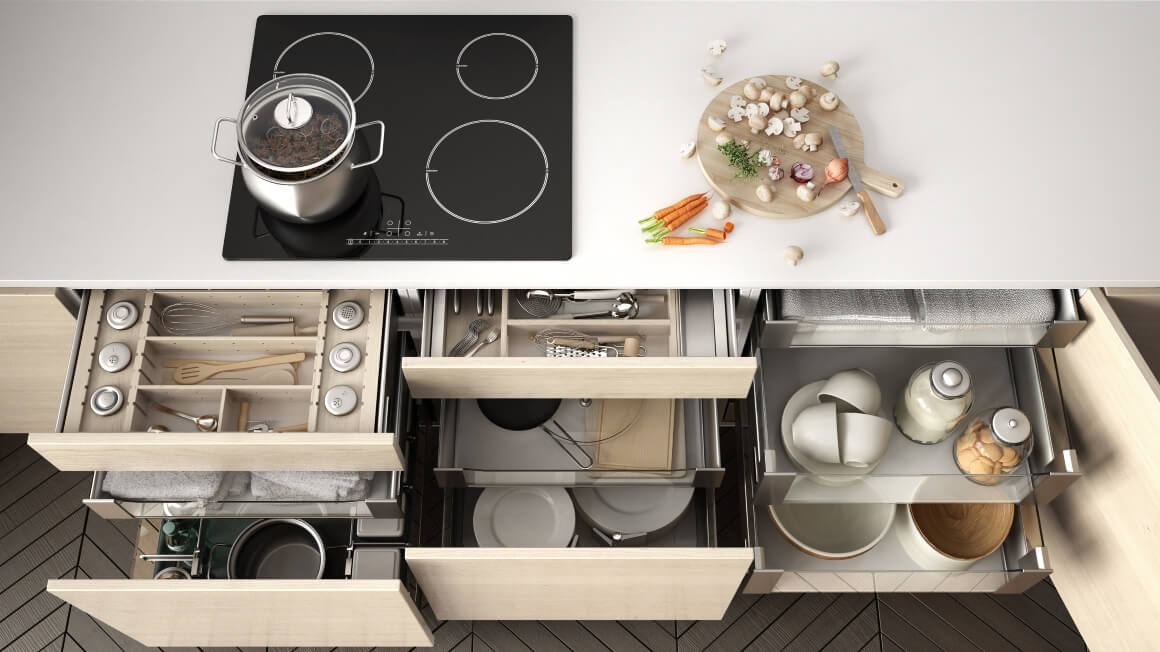
Health and wellness September 8, 2023 By
Eliminate Stress with Organization
According to a recent survey, 60% of Americans have been late to work or school because of misplaced car keys or other items. Organizing your home and office can make the difference between a stressful or peaceful and productive day.
Did you know that eliminating clutter in your life can positively affect your health and your wealth?
Life is busy. Many of us need help finding the time to manage the clutter that builds up. If you are living with a closet, workspace, or living area containing disorganized collections of items, here’s a great reason to get busy tidying up: You could lower your anxiety, increase your well-being, and improve your finances.
Clutter Can Contribute to Stress
When you enter a cluttered room, your eye doesn’t know what to land on first, and your brain works overtime to make sense of all the details captured by your senses. This experience explains the lack of focus you might feel when your workspace, kitchen, or entire home is cluttered.
When that cluttered space, filled with your possessions, is your responsibility, the stress response is even greater. Studies show that people living in a cluttered environment experience higher and more prolonged stress levels. They even suffer stress worrying that their homes aren’t clean enough or organized, but they struggle to embark on a path to reduce the clutter and relieve the pressure.
How Disorganization Contributes to Financial Stress
When you are under stress, you tend to make poor decisions. As a result, your finances could suffer. At the basis of your clutter are a bunch of items you paid money for. Perpetuating a cycle of disorganization affects your financial life in several ways:
- Time (and money) are wasted looking for things: Remember the adage: Time is money? Imagine how much earlier you could get to work if you didn't have to look for your car keys daily. When you can't find the correct receipt or last month's credit card bill, you not only waste time, but you’re less likely to get the refund you are entitled to or end up paying late fees.
- A cluttered lifestyle can lead to a negative relationship with money: The habits that result in a disorganized living space can also lead to problems managing money and staying on top of finances. Disorganization can impact your mental health and affect how you make money decisions, from overspending and increasing debt to living in larger, more expensive homes.
- Storage units are a zero-sum game: You may be tempted to rent a storage space to manage your clutter. Long-term storage rental, however, represents an expenditure you cannot capitalize on, and it puts your excess stuff out of reach, so you're even less likely to use it. Rental storage space will never increase in value, but the rent can go up. Storing stuff you never use means you are not getting any return on the money you spent to purchase those items.
- Bills get lost and are therefore not paid on time: The number one factor in your credit score is whether you pay your bills on time. Clutter may be holding your credit score down. Even if you receive and pay your bills online, a cluttered home can distract your focus from crucial activities, causing you to miss payment deadlines.
- Money is wasted buying things you already have: Buying something once is an expense. If you need something and use it, the cost is justified. If you misplace it and have to buy another one, that is a waste of money. If you find the first item, but it is ruined because it was under a pile of wet towels in the laundry room, you'll have to buy another one without ever benefitting from the initial expenditure.
Think of the clutter in your home as money since you paid for all those items at some point. You wouldn't leave cash lying around in crumpled heaps. You would sort and stack it neatly and store it in a protected place where you could access it when you needed to make a purchase. That's the best way to manage your possessions and avoid unnecessary financial stress.
9 Steps to Declutter Your House
You do not have to live with the stress of a cluttered, disorganized home. Reduce your stress and get organized with these nine steps:
- One room at a time: Clutter makes it hard for your brain to work efficiently, so decluttering needs to be a divide-and-conquer activity. It is easy to get overwhelmed by the whole job in front of you. Breaking it up into several small jobs will help. If you keep your decluttering process organized, you’ll find it more effective. Getting one room done will motivate you to move on to the next room until the whole house is decluttered and organized.
- Sort similar items into piles: Looking closely at a cluttered room, you see various things lying around in random places. To bring order to the scene, start by organizing things into piles. In the bedroom, for example, you might create separate piles for clean clothes, dirty clothes, towels, shoes, reading material, etc.
- Discard the junk: On every pile, you will find a few broken, worn-out, or outdated things. These things have no value. You cannot use them, and you cannot sell them. That is the definition of junk. Lighten your load by donating these items to charity if they are still in good condition or throwing them away.
- Choose your favorites: One value of creating piles of like things is that you can easily spot duplicates. As mentioned above, people who live with clutter often make superfluous repeat purchases. Not only is this a waste of money, but it is also a waste of space and contributes to the clutter problem. For every duplicate item, save your favorite version and put the others in a discard pile.
- Sell or consign excess items: All those items on the discard pile represent money, even if it is just a couple of dollars. The total value of the entire stack could be in the hundreds or even thousands, depending on how much stuff you have. Have a garage sale, partner with a neighbor already planning a garage sale, use an online selling platform, or bring things to a consignment shop. Try to recoup some of the monetary value invested in your excess items and get them out of your way so you don’t have to find a place to store them.
- Store items for handy use: Time to put away the keepers. Think about where you might use each item and try to store it as close to that location as possible—no punchbowls in the bathroom closet or hammers in the kitchen. You'll find that the storage areas in each room are designed to accommodate items that belong in that room. For example, the bedroom closet has space for hanging clothes, and the kitchen drawer is divided for storing silverware. Organizing your cabinets and drawers will make daily life easier and relieve mental stress.
- Designate one location for important papers: Part of organizing is knowing where to find things when needed. Your financial life will become less stressful when your bills aren't lost in the junk mail. Choose a location to drop the mail when you bring it inside each day. Also, designate a space for bills and important papers so you can find them when needed.
- Snapshot your closets: You should be proud of your accomplishments when you finish organizing and decluttering your house. Taking a picture will memorialize the result of your efforts. Keeping a snapshot of the interior of every closet, cabinet, and drawer on your phone can help you refrain from buying things you already have. Check the photo before purchasing those wine glasses on sale at your favorite home goods store. If you already have wine glasses, you can save that money and get yourself an ice cream on the way home instead.
- Learn to put things away: The photos on your phone can also help you remember where things go in your newly organized space. Keep things organized by learning to put items away after you use them. After all your efforts to organize your house, you won't want to clutter it up again. When buying new things, consider discarding the old ones and putting the new ones in their proper places.
It’s Free and Good for You!
It costs little money to declutter and organize your home. In fact, you could make money by selling the items you don't need in decluttering. Getting organized can also improve your health by eliminating stress and bringing you closer to financial well-being. The reduction in unnecessary and repeat purchases will positively affect your budget.
When you’re ready to learn some other money-saving strategies, contact your financial institution. They have the money-management tools and expertise to help you reach your financial goals.




